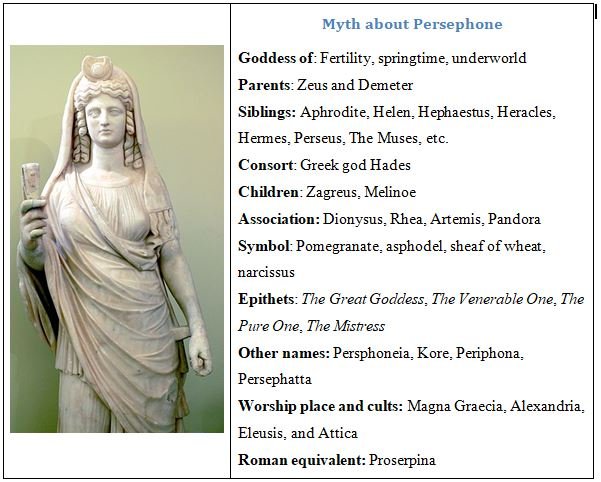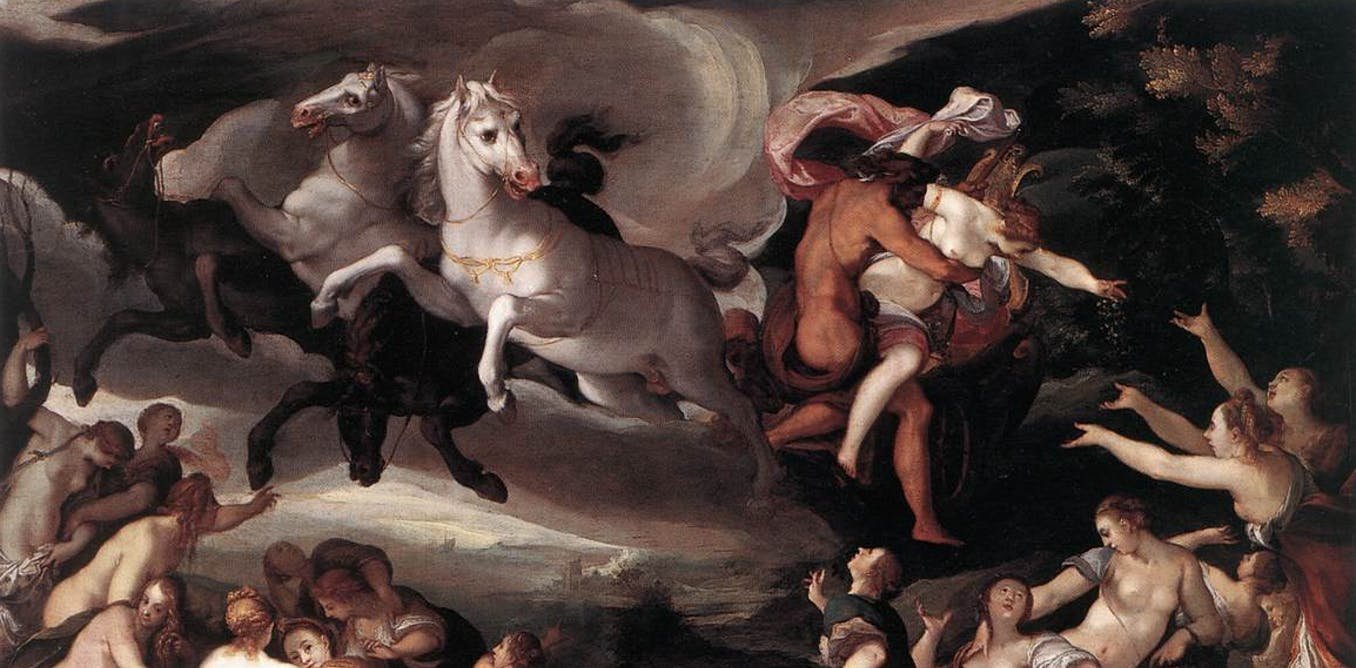Persephone and Hades: How the seasons came to being

Persephone and Hades |Myth about Persephone
Revered as the goddess of fertility and the queen of the Underworld, Persephone was the daughter of Zeus and Demeter. Ancient Greeks believed that the origin of the seasons is related to the abduction of Persephone by Hades, the Greek god of the Underworld.
Persephone and Hades: Abduction of Persephone

Abduction of Persephone by Hades | Heintz Joseph the Elder, The Rape of Persephone, circa 1595
The abduction of Persephone by Hades is one of the most famous stories in Greek mythology. The abduction of Persephone is related to the cycle of the seasons.
Hades seeks Zeus’ approval to marry his daughter, Persephone
According to the myth, Hades once felt lonely in the vast and spectacular castle in his Underworld. He desired nothing than to take for himself a wife. His pick was the goddess Persephone – the only daughter of his sister Demeter.
Hades approaches his brother Zeus, the sky god and king of the gods. The two male gods – Zeus and Hades – agree to let Hades marry Demeter’s daughter Persephone.
The Narcissus Flower
On a beautiful day, Persephone and her fellow maidens were busily picking flowers in the Nysian fields. Persephone got lost in the work and unknowingly separated from her maidens. According to one myth, she was lured away by a beautiful narcissus flower. Just as she was about to collect those flowers, the soil beneath her feet started trembling, and out came the Greek god Hades – Persephone’s uncle. In a split second, Hades seized Persephone and placed her in his four-horse drawn, golden chariot before riding off into the Underworld. The ruler of the underworld abducted Persephone to be his wife and queen of the Underworld.
Demeter neglects her duty of attending to the crops
When news of her daughter’s abduction reached Demeter, the goddess of grain and agriculture went into a severe depression.
Demeter quickly committed herself to wandering the earth in an effort to get back her missing daughter. Preoccupied with this task of hers, Demeter is believed to have neglected her duties – that is attending to the grains and crops of the land. As a result, the earth became barren and the people starved and suffered.
The blight on the land causes the people to starve and go into despair. On the brink of death, the people appeal to the gods to intervene.
It is interesting to note that the Greek gods were believed to thrive on the continuous worship and tributes from the people. Therefore, were human beings to die of starvation, the gods would be plunged into a state of despondency.
As a result, Zeus steps in and tries to convince his sister Demeter to go back to attending to the crops. Demeter refuses and she vows never to let the crops grow until she is reunited with Persephone.

Persephone and Hades | Persephone’s absence caused the earth to plunge into a wintery condition
Zeus’ intervention
The king of the gods, Zeus, intervened by sending Hermes – the messenger of the gods – to the Underworld. Hermes was tasked with reuniting Persephone with her mother Demeter. However, just as Persephone was about to leave the Underworld, Hades tricked her into eating some pomegranate. By the laws in the Underworld, when one eats in the Underworld, he or she is bound to spend eternity in the place.
Read More:
The birth of the seasons
Zeus then had to intervene again; he struck a deal with Hades, allowing Persephone to stay on earth, with her mother, for two-thirds of the year. In the remaining one-third of the year (i.e. winter), Persephone was bound to the Underworld.
And just like that, the seasons came to being. Thus whenever Persephone was with Demeter, the crops and flowers grew – a representation of spring and summer. However, whenever Persephone was with her husband Hades, the world went into wintery conditions and nothing grew.

Persephone and Hades| Persephone’s return to the land of the living ushered in the spring season and bountiful harvests
Conclusion
It is worth noting that there is an underlying message in this story. The movement of Persephone from the upper world to the lower world, and vice versa, symbolizes the cycle of life and death. The Greeks, particularly the city of Eleusis, believed that death and life were not mutually exclusive. Knowing that one’s soul continued to live on (in another state) allowed them to embrace death. Humans are therefore immortal souls living for a brief while in mortal bodies.
Finally, the story of Persephone and Hades is underpinned by a central theme: the power of a mother’s love. It can be seen that Demeter’s response to the disappearance of her daughter Persephone is palpable. The ensuing chaos turns into a nightmare for all the gods. Not even the machinations of Zeus and Hades could tear those two goddesses apart. It is a remarkable story that has maternal power written all over it.
Did you know: The Greek word “meter” translates into “mother”?




























Just had a dream about describing Persephone to a college class. At the time, my child was running amuck causing me distress that surpassed even my embarrassment about how the child was disturbing an entire class on Greek mythology. I was in tears and physical pain and had to wake up and investigate and record. Not able to draw any conclusions at this time.